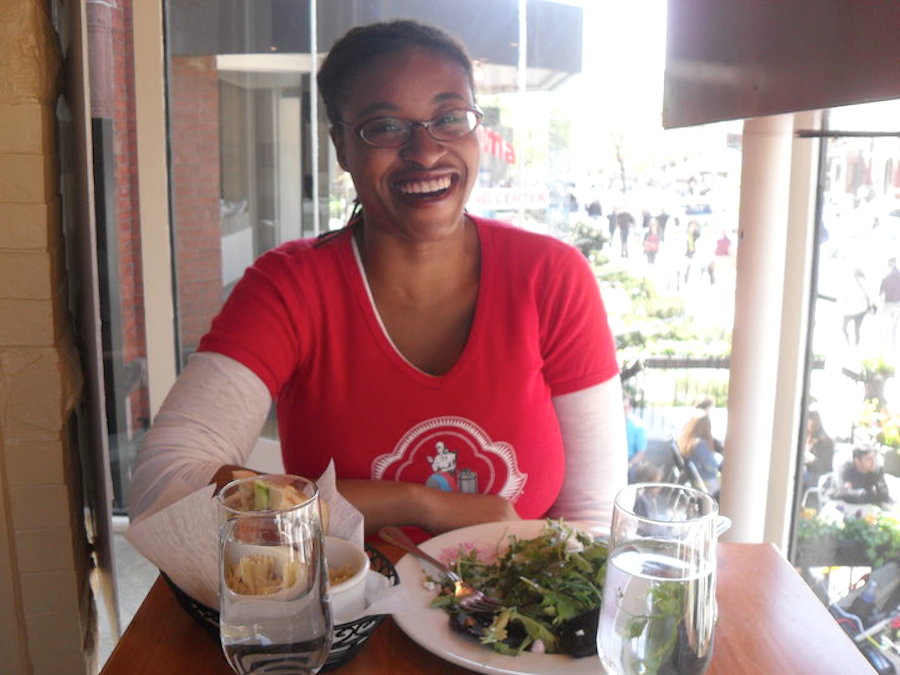By Gwendolyn
Dear Bi Sisters Who Are in Their Twenties and Thirties,
In a few months I’ll be 40 years old. In the past 20 years, I have grown more knowledgeable about myself. I faced my fears and anxieties about being rejected by friends and relatives by being an out bisexual. I became more confident about needs: having people in my inner circle who have the skills to be fully engaging and emotionally expressive and who can celebrate my authentic self.
When I was 22, during my first semester at the Harvard Graduate School of Education, my Soul Sister committed suicide; she was 19. I was devastated, emotionally isolated, felt unheard, and grieved alone. During the first few months of my grief, I adopted a lifestyle of healing. I made a promise to myself that I would ask for help when I need it, comfort and soothe myself; create and initiate support systems; and be my own cheerleader.
In keeping with the customs of my Haitian elders, I will give you some unsolicited advice; however, the advice I will share with you is the same advice that I practice myself.
Practice radical self-acceptance. Accept who you are at this moment. Accept that you can and will change your internalized biphobia or self-doubt once you decide to accept yourself as you are, and connect with others who can support you.
Be vulnerable. It has always been part of my personality to express my intellect and feelings. I express my authentic self, show my humanity and vulnerabilities, regardless of whether other people feel uncomfortable about this part of my personality. [www.ted.com/talks/brene_brown_on_vulnerability]
Develop your emotional support system. Having a community of people who truly get me becomes even more important to me as the years pass by. My need for emotional support and consistent sisterhood has increased. I found out who my true supportive ride-or-die friends are [www. wikihow.com/Be-a-Ride-or-Die-Chick] when I hit a major life challenge, i.e., gave birth, or experienced a death in my family, financial instability, or illness. Some friends will vanish and return when you feel better and others will step up and have your back during the whole tumultuous journey.
Be your own cheerleader. During the times I felt alone, isolated with deep despair, and had suicidal thoughts, I have used this mantra to help me keep breathing: “My ancestors have been through worse; I feel this way because I can’t cope anymore with all this hurt and pain, but I do want to live. I need to find new ways to cope with life and I will ask a professional for help.” That gets me through another day. [www.wingsfortheheart.com/self-esteem-being-your-owncheerleader.htm and 1-800-273-8255, National Suicide Prevention Lifeline]
Save your emotional energy – stress causes physical pain. There have been many times when I felt I was emotionally safer when I was in the closet because then I didn’t have to deal with the anxiety and frustration of receiving the silent, staring, or deer-in-headlights treatment or be exposed to ignorant biphobic questions after saying the word bisexual. I learned that I don’t have to explain and re-explain my culture, race, or sexual identity to anyone. It’s not my job to repeatedly educate, coach, or mentor others to understand me. People are responsible to do their own work. One article geared towards doing work on white privilege but also applicable to heterosexism is Maggie Potapchuck’s “Doing the Work: Unearthing Our Own White Privilege [www.mpassociates.us/pdf/DTW.pdf].
Don’t give up on romance. You get wiser about growing your romantic garden as an out bisexual. Throughout the past 20 years I learned more about what type of relationships I needed and what type were toxic to me. I got better at clearly defining what I wanted in various types of relationships. Here are some weeding tips that have helped me throughout the years.
Make a list of what you want in a relationship and what qualities and emotional skills you desire in a partner. Mentally check off whether that person fits your needs.
Don’t force yourself on people. Look for others who are engaging and are equally interested in wanting to be with you. When a person says, “I’m busy,” on a regular basis, take that as a sign that they may not make time for you, their time management skills are lacking, and they just don’t have the skills to make you a priority.
If you are romantically or sexually interested in someone, let them know. Tell them: I really like you, I’d like to spend more time with you and get to know you better. Over time, ask them open-ended questions. Ask: Are you dating anyone else right now, are you married or in a committed relationship? How do you feel about bisexuals? How do you feel about public displays of affection? How do you feel about dating cross culturally? How do you feel about our age difference? What are you like when you feel angry or frustrated? How do you release your stress? How do you practice safe sex? Yes, some of these questions sound corny and you might feel awkward asking them, but hey, you said them and now they’re out there. You just have to sit back and listen to their responses.
Gwendolyn is the founder of Boston’s BIWOC, Bisexual Woman of Color, an online and in-person support and discussion group. She is also a writer, librarian, mental health advocate, and vegan personal chef. For more information: https://www.facebook.com/BIWOC.Community or biwocinfo@gmail.com

